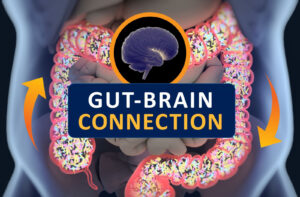
- Apr 19, 2024
- 0 Comment(s)
The Gut-Brain Axis: The Vital Connection Influencing Your Health and Well-being
If you've ever had a "gut feeling" about something, or felt "butterflies" in your stomach when nervous, you've experienced the gut-brain connection. This intricate relationship between the gut and brain is so powerful that it can influence your mood, cognitive function, and overall health. Natural health enthusiasts have long been intrigued by the body's interconnectivity, and recent research has illuminated the profound significance of the gut-brain axis. Let's delve deeper into this fascinating subject.
What is the Gut-Brain Axis?
The gut-brain axis refers to the bi-directional communication system between the central nervous system (brain and spinal cord) and the gastrointestinal tract. This communication is facilitated by various pathways, including neural (via the vagus nerve), endocrine (hormones), immune (cytokines), and humoral pathways 1.
The Gut: Our "Second Brain"
Nicknamed our "second brain," the enteric nervous system (ENS) resides in the gut and consists of over 100 million neurons. The ENS governs the function of the gastrointestinal system. It communicates with the brain via the vagus nerve, which is the primary neural pathway in the gut-brain axis 2.
Role of the Microbiota
The gut is home to trillions of microorganisms, including bacteria, fungi, and viruses. This community, known as the microbiota, plays a pivotal role in the gut-brain axis. Some bacteria produce neurotransmitters such as serotonin, dopamine, and gamma-aminobutyric acid (GABA) that can influence brain function 3.
Recent studies suggest that changes in the composition of the gut microbiota can impact behavior and cognitive function, potentially contributing to conditions like anxiety, depression, and even neurodegenerative diseases 4.
How the Gut Influences the Brain
- Neurotransmitter Production: Approximately 90% of the body's serotonin, a neurotransmitter crucial for mood regulation, is produced in the gut 5.
- Inflammation and Immune Response: Chronic gut inflammation can lead to systemic inflammation, which has been linked to mood disorders. A balanced microbiota promotes a healthy immune response, which in turn can influence brain health 6.
- Stress Response: The gut-brain axis is sensitive to stress. Stress can alter gut permeability and microbiota composition, which can then influence brain function and mental health 7.
Why It Matters for Natural Health Enthusiasts
- Holistic Health: Understanding the gut-brain axis reinforces the idea of holistic health, where mind and body are interconnected.
- Diet and Nutrition: A balanced diet, rich in prebiotics and probiotics, can support a healthy microbiota, which in turn can influence brain health 8.
- Mindfulness and Stress Reduction: Techniques such as meditation, yoga, and deep-breathing exercises can positively influence the gut-brain axis by reducing stress.
Conclusion
The gut-brain axis isn't just a fascinating scientific discovery; it's a testament to the intricate and delicate balance of systems within our bodies. This bi-directional pathway underscores how deeply interconnected seemingly independent systems can be, a relationship that, once understood, can unlock a deeper appreciation for holistic health.
For enthusiasts and practitioners of natural health, the implications are profound. Recognizing the impact of the gut on mental and emotional states means that dietary and lifestyle choices can be geared not just towards physical health but mental wellness too. Whether it's through the inclusion of probiotics in one's diet or by making lifestyle changes that reduce gut inflammation, there are tangible steps one can take to positively influence the gut-brain connection.
Moreover, as cutting-edge research delves further into the nuances of this axis, we gain more tools and knowledge to fine-tune our approach to health. It's an exciting time, where the symbiotic relationship between the gut and brain is drawing the attention of scientists, nutritionists, and health practitioners worldwide. In essence, the nurturing of our gut and brain isn't just about preventing illnesses; it's about elevating our overall quality of life. As we move forward, the message is clear: taking care of our gut is tantamount to taking care of our mind, and in doing so, we embrace a holistic approach to well-being.
References:
Footnotes
- Carabotti M., Scirocco A., Maselli M. A., & Severi C. (2015). The gut-brain axis: interactions between enteric microbiota, central and enteric nervous systems. Annals of Gastroenterology, 28(2), 203–209. ↩
- Furness, J. B. (2012). The enteric nervous system and neurogastroenterology. Nature Reviews Gastroenterology & Hepatology, 9(5), 286–294. ↩
- Strandwitz P. (2018). Neurotransmitter modulation by the gut microbiota. Brain Research, 1693(Pt B), 128–133. ↩
- Cryan, J. F., & Dinan, T. G. (2012). Mind-altering microorganisms: the impact of the gut microbiota on brain and behavior. Nature Reviews Neuroscience, 13(10), 701–712. ↩
- Yano, J. M., Yu, K., Donaldson, G. P., Shastri, G. G., Ann, P., Ma, L., ... & Hsiao, E. Y. (2015). Indigenous bacteria from the gut microbiota regulate host serotonin biosynthesis. Cell, 161(2), 264-276. ↩
- Maes, M., Kubera, M., Leunis, J. C., & Berk, M. (2012). Increased IgA and IgM responses against gut commensals in chronic depression: further evidence for increased bacterial translocation or leaky gut. Journal of Affective Disorders, 141(1), 55–62. ↩
- Konturek, P. C., Brzozowski, T., & Konturek, S. J. (2011). Stress and the gut: pathophysiology, clinical consequences, diagnostic approach and treatment options. Journal of Physiology and Pharmacology, 62(6), 591–599. ↩
- Markowiak, P., & Śliżewska, K. (2017). Effects of Probiotics, Prebiotics, and Synbiotics on Human Health. Nutrients, 9(9), 1021. ↩




